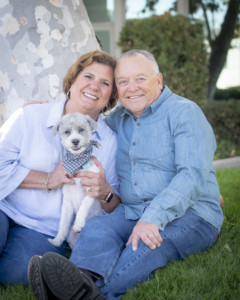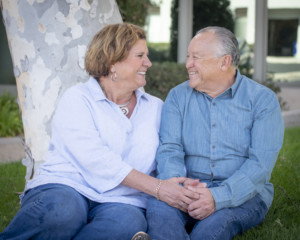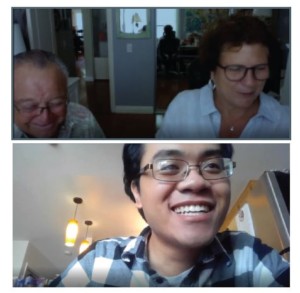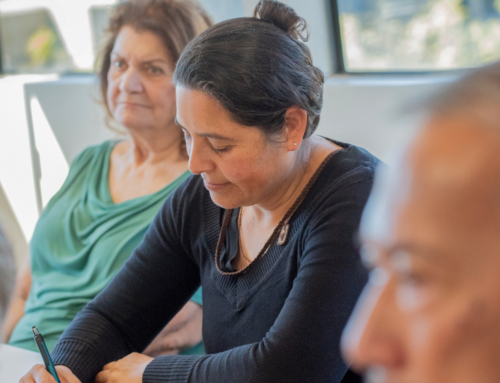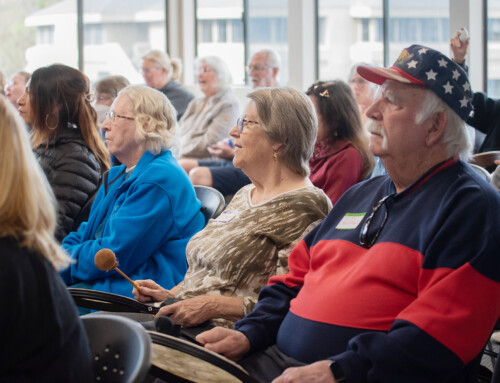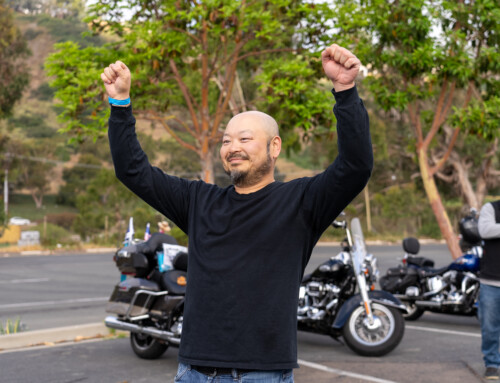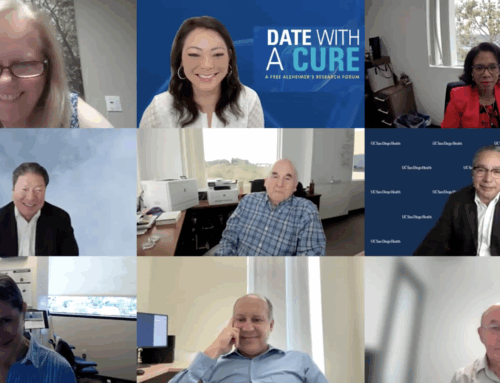“Long ago and far away…” Teri Enos-Guerrero begins when describing how she and her husband, Albert Guerrero, first met.
It’s obvious these two love each other…and have fun together. A conversation with them is full of laughter and playful banter.
As Albert jokes that his next car will be a Lamborghini, they both crack up.
“You goofball,” she says.
“You goofball,” he responds back.
“I’ve got to get that laughter from her,” he explains. Especially over the last two years…
Teri, 62, is originally from Orange County, and Albert, 63, grew up in San Diego. They first met at San Diego State University. Albert’s best friend from childhood was married to one of Teri’s sorority sisters, so they were in the same social circles. But unlike every fairytale beginning, their relationship with each other started off purely platonic.
“I had no interest in him whatsoever,” Teri teases. “I just saw him as the short friend!” They went on with their separate lives, occasionally running into each other over the years. But then, at a New Year’s Eve party in 2006, Teri saw him in a different way for the very first time.
“He was wearing a sports coat. He’s nervous. I’m nervous. I spilled wine on him,” she chuckles.
“Everything kind of changed when I watched him throughout the night being so sweet to my friend’s mom.”
The care and compassion with which Albert treated the older woman moved Teri in a profound way. They’ve been together ever since, getting married in 2012.
“And they lived happily ever after,” Albert adds with a smile.
Fighting for a diagnosis
In 2014, Teri started noticing some behavior changes in Albert, like getting lost in familiar places. They were worrisome enough that she started taking notes. Albert’s psychiatrist kept prescribing him antidepressants. He thought his behavior was just absentmindedness from depression. But Teri knew the issues went deeper.
After being referred to a new neuropsychologist, the result was again “pseudodementia” or absentmindedness from depression. They couldn’t get retested again for another year, so a year later they went back and it was the same misdiagnosis, for now, the third time.
Finally – after four long years – Albert was diagnosed with Alzheimer’s in 2018.
That December, Albert lost his license and his job at Trader Joe’s. He loved working there, and they were accommodating even as his memory started to fade. But after Teri received a call from his boss, they knew it was time for Albert to retire.
He says he’s struggled with the loss of independence since then.
“If I want to do something, I want to do something, but at this point, I can’t always do that,” he says. “I had to turn in my car, it’s been a lot of change…it’s very frustrating. It was just *boom* gone, you can’t have it.”
During this difficult time, Teri also lost both her parents.
“We were up with them at Orange County and he was a bit lost, so that was a bit difficult because I wasn’t as attentive to him as I wanted to be,” she says.
“You know you’re doing the best you can, but you don’t know you’re doing a good job. There’s no rulebook.”
Finding a community
Teri says it’s been especially challenging as a care partner during the COVID-19 pandemic – but Alzheimer’s San Diego has continued to be a major source of comfort and support.
Before the pandemic, they went through the Take Charge program and attended Date With A Cure (an Alzheimer’s research forum) together. Teri regularly attends her support group twice a month…now, it’s just done through video chat to keep everyone safe.
“The community, the support, the friends we’ve made through here. I personally couldn’t have done it without them” she says.
The couple has also enrolled in the ALZ Companion program and has built a wonderful relationship with their volunteer, Perry Nam.
The ALZ Companion program pairs a volunteer with someone living with dementia. It not only gives Teri a break as a care partner, but it also allows Albert to bond with a new friend.
LEARN MORE | Virtual ALZ Companion program
Perry is a recent UC San Diego graduate. He began volunteering in September 2019. This was a natural fit for him, as he helped care for his late grandmother with Alzheimer’s.
He started out visiting with Albert in person, but because of the coronavirus, they now have online visits using Zoom. They used to do puzzles together, play scrabble, go for walks to a nearby Mexican restaurant, and text a lot just to check in on one another. Now their game activity has gone virtual, and they have taken “trips” to the San Diego Zoo through the live cams.
RELATED | 9 Cognitively stimulating activities you can do at home
Albert admits he had initial hesitations about Perry coming in. After all, he was a stranger.
“I wasn’t crazy about it. I was so worried,” he explains. “But when he came it was fine and easy. It was so much worry for nothing”.
Perry was just as nervous for their first visit.
“I didn’t know if the generation gap would be an issue and was unsure about how I should talk to him and plan out our activities. But I found our personalities were very similar and we had a lot in common,” he says.
Teri says the ALZ Companions program is such a gift, both in-person and in its current virtual form.
“Social interaction with someone else who knows what’s going on and receives training about what’s appropriate, mind-stimulating…it’s comforting for me to know someone competent is with him, and that I can leave and feel comfortable enough to get a break,” she shares.
Perry says volunteering has impacted him too.
“Back in those college days, I was introverted and shy. But through these companionship activities with families I’ve learned how to reach out more,” he explains. I’ve learned how to be much more empathetic and patient.”
Both Teri and Albert say Perry has been such a blessing to them. It helps to have someone who cares and is willing to open their heart to them.
The feeling is mutual. Perry showed them how much they mean to him, too, by making sure they were part of a life-changing moment for him.
“(Perry) was getting his MCAT scores back, and he goes, ‘You have to look for me,’” Teri recounts. “So I did – and he did really well! It was fun to share that with him.”
It’s moments like this that Teri is especially grateful for the support system she and Albert have found through Alzheimer’s San Diego. Albert notices, too, and is grateful for how Teri has devoted herself to being a care partner.
“It’s nice to have a wife that goes to everything she can go to, to learn, so she can come home and take care of me,” Albert says lovingly. “She is a good woman.”
That’s something he tries to tell Teri every day.
“He’ll say, ‘You don’t know how much I appreciate you taking care of me. I don’t think there’s a lot of people that would do that,’” Teri says.
“But I know there are a lot of people that do this – I’ve met them at my support group at Alzheimer’s San Diego.”
